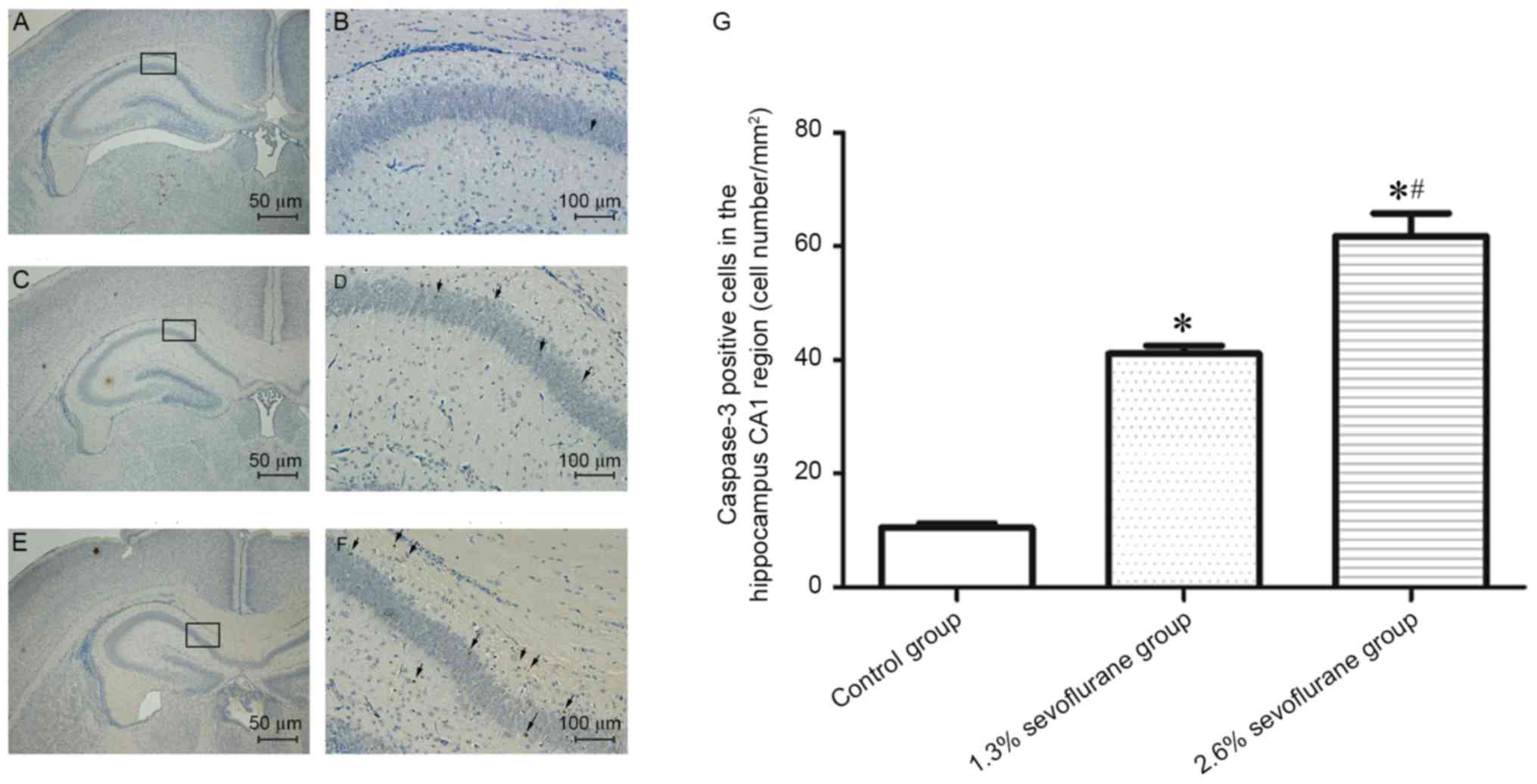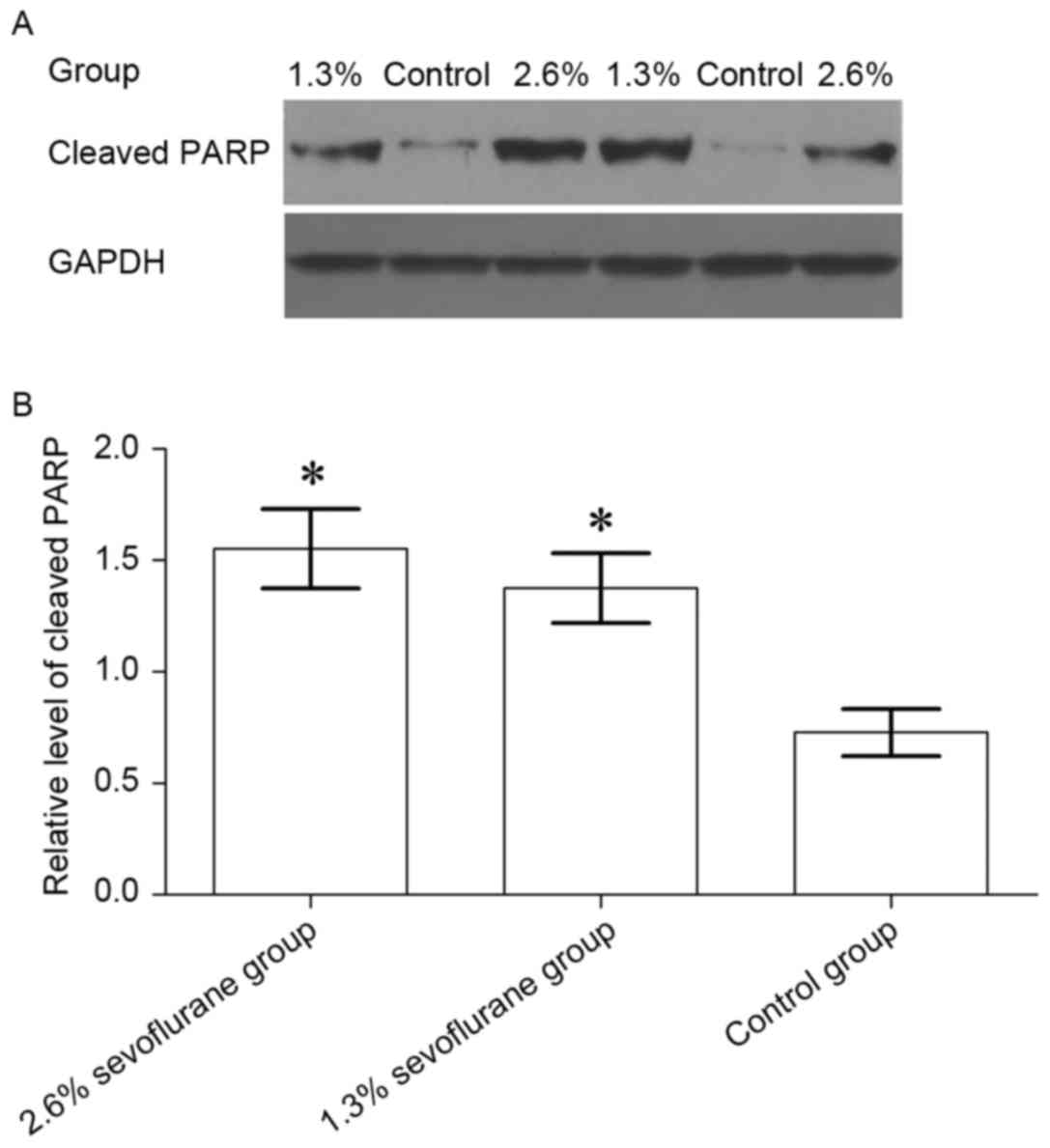|
1
|
Erden V, Erkalp K, Yangin Z, Delatioglu H,
Kiroglu S, Ortaküz S and Ozdemir B: The effect of labor on
sevoflurane requirements during cesarean delivery. Int J Obstet
Anesth. 20:17–21. 2011. View Article : Google Scholar : PubMed/NCBI
|
|
2
|
Vora KS, Shah VR, Patel D, Modi MP and
Parikh GP: Sevoflurane versus propofol in the induction and
maintenance of anaesthesia in children with laryngeal mask airway.
Sri Lanka J Child Health. 43:77–83. 2014. View Article : Google Scholar
|
|
3
|
Lerman J, Sikich N, Kleinman S and Yentis
S: The pharmacology of sevoflurane in infants and children.
Anesthesiology. 80:814–824. 1994. View Article : Google Scholar : PubMed/NCBI
|
|
4
|
Liu F, Rainosek SW, Frisch-Daiello JL,
Patterson TA, Paule MG, Slikker W Jr, Wang C and Han X: Potential
adverse effects of prolonged sevoflurane exposure on developing
monkey brain: From abnormal lipid metabolism to neuronal damage.
Toxicol Sci. 147:562–572. 2015. View Article : Google Scholar : PubMed/NCBI
|
|
5
|
Tagawa T, Sakuraba S, Kimura K and
Mizoguchi A: Sevoflurane in combination with propofol, not
thiopental, induces a more robust neuroapoptosis than sevoflurane
alone in the neonatal mouse brain. J Anesth. 28:815–820. 2014.
View Article : Google Scholar : PubMed/NCBI
|
|
6
|
Zheng S, Chen X, Wang Y and An L: Effects
of sevoflurane on brain neuroapoptosis and ability of long-term
learning and memory in newborn rats. Beijing Da Xue Xue Bao.
47:674–678. 2015.(In Chinese). PubMed/NCBI
|
|
7
|
Baydas G, Reiter R, Akbulut M, Tuzcu M and
Tamer S: Melatonin inhibits neural apoptosis induced by
homocysteine in hippocampus of rats via inhibition of cytochrome c
translocation and caspase-3 activation and by regulating pro-and
anti-apoptotic protein levels. Neuroscience. 135:879–886. 2005.
View Article : Google Scholar : PubMed/NCBI
|
|
8
|
Zhou X, Song FH, He W, Yang XY, Zhou ZB,
Feng X and Zhou LH: Neonatal exposure to sevoflurane causes
apoptosis and reduces nNOS protein expression in rat hippocampus.
Mol Med Rep. 6:543–546. 2012. View Article : Google Scholar : PubMed/NCBI
|
|
9
|
Istaphanous GK, Howard J, Nan X, Hughes
EA, McCann JC, McAuliffe JJ, Danzer SC and Loepke AW: Comparison of
the neuroapoptotic properties of equipotent anesthetic
concentrations of desflurane, isoflurane, or sevoflurane in
neonatal mice. Anesthesiology. 114:578–587. 2011. View Article : Google Scholar : PubMed/NCBI
|
|
10
|
Albasser MM, Amin E, Lin TC, Iordanova MD
and Aggleton JP: Evidence that the rat hippocampus has contrasting
roles in object recognition memory and object recency memory. Behav
Neurosci. 126:659–669. 2012. View
Article : Google Scholar : PubMed/NCBI
|
|
11
|
Chambers RA, Potenza MN, Hoffman RE and
Miranker W: Simulated apoptosis/neurogenesis regulates learning and
memory capabilities of adaptive neural networks.
Neuropsychopharmacology. 29:747–758. 2004. View Article : Google Scholar : PubMed/NCBI
|
|
12
|
Sung YJ and Ambron RT: PolyADP-ribose
polymerase-1 (PARP-1) and the evolution of learning and memory.
Bioessays. 26:1268–1271. 2004. View Article : Google Scholar : PubMed/NCBI
|
|
13
|
Cohen-Armon M, Visochek L, Katzoff A,
Levitan D, Susswein AJ, Klein R, Valbrun M and Schwartz JH:
Long-term memory requires polyADP-ribosylation. Science.
304:1820–1822. 2004. View Article : Google Scholar : PubMed/NCBI
|
|
14
|
Goldberg S, Visochek L, Giladi E, Gozes I
and Cohen-Armon M: PolyADP-ribosylation is required for long-term
memory formation in mammals. J Neurochem. 111:72–79. 2009.
View Article : Google Scholar : PubMed/NCBI
|
|
15
|
Zhou B, Cai Q, Xie Y and Sheng ZH: Snapin
recruits dynein to BDNF-TrkB signaling endosomes for retrograde
axonal transport and is essential for dendrite growth of cortical
neurons. Cell Rep. 2:42–51. 2012. View Article : Google Scholar : PubMed/NCBI
|
|
16
|
Stansfield KH, Pilsner JR, Lu Q, Wright RO
and Guilarte TR: Dysregulation of BDNF-TrkB signaling in developing
hippocampal neurons by Pb(2+): Implications for an environmental
basis of neurodevelopmental disorders. Toxicol Sci. 127:277–295.
2012. View Article : Google Scholar : PubMed/NCBI
|
|
17
|
Lai H, Zhao H, Zeng L and Lv Y: BDNF and
TrkB mRNA expression in aged hippocampus neurons and their
relationship with learning and memory. Prog Anatomical Sci.
10:353–356. 2004.(In Chinese).
|
|
18
|
Barrett GL, Reid CA, Tsafoulis C, Zhu W,
Williams DA, Paolini AG, Trieu J and Murphy M: Enhanced spatial
memory and hippocampal long-term potentiation in p75 neurotrophin
receptor knockout mice. Hippocampus. 20:145–152. 2010.PubMed/NCBI
|
|
19
|
Yao D, He X, Wang J and Zhao Z: Effects of
PI3K/Akt signaling pathway on learning and memory abilities in
neonatal rats with hypoxic-ischemic brain damage. Zhongguo Dang Dai
Er Ke Za Zhi. 13:424–427. 2011.(In Chinese). PubMed/NCBI
|
|
20
|
Zhang JF, Zhou W and Wang T: Effects of
propofol on studying and memory dysfunction and cortex trkb/akt
pathway in focal cerebral ischemia/reperfusion injury of rats.
Herald Med. 2:0082012.(In Chinese).
|
|
21
|
Sadrian B, Subbanna S, Wilson DA,
Basavarajappa B and Saito M: Lithium prevents long-term neural and
behavioral pathology induced by early alcohol exposure.
Neuroscience. 206:122–135. 2012. View Article : Google Scholar : PubMed/NCBI
|
|
22
|
National Research Council: Guide for the
Care and Use of Laboratory Animals. National Academies Press;
Washington, DC: pp. 1072–1073. 2011
|
|
23
|
Wiklund A, Granon S, Faure P, Sundman E,
Changeux JP and Eriksson LI: Object memory in young and aged mice
after sevoflurane anaesthesia. Neuroreport. 20:1419–1423. 2009.
View Article : Google Scholar : PubMed/NCBI
|
|
24
|
Yue T, Shanbin G, Ling M, Yuan W, Ying X
and Ping Z: Sevoflurane aggregates cognitive dysfunction and
hippocampal oxidative stress induced by β-amyloid in rats. Life
Sci. 143:194–201. 2015. View Article : Google Scholar : PubMed/NCBI
|
|
25
|
Zhang F, Feng X, Zeng Q, Wang B,
Wilhelmsen K, Li Q, Cao X and Yu B: Sevoflurane induced amnesia
inhibits hippocampal Arc expression partially through
5-hydroxytryptamine-7 receptors in the bilateral basolateral
amygdala in rats. Neurosci Lett. 562:13–18. 2014. View Article : Google Scholar : PubMed/NCBI
|
|
26
|
Zhong T, Guo Q, Zou W, Zhu X, Song Z, Sun
B, He X and Yang Y: Neonatal isoflurane exposure induces
neurocognitive impairment and abnormal hippocampal histone
acetylation in mice. Plos One. 10:e01258152015. View Article : Google Scholar : PubMed/NCBI
|
|
27
|
Musumeci G, Castrogiovanni P, Loreto C,
Castorina S, Pichler K and Weinberg AM: Post-traumatic caspase-3
expression in the adjacent areas of growth plate injury site: A
morphological study. Int J Mol Sci. 14:15767–15784. 2013.
View Article : Google Scholar : PubMed/NCBI
|
|
28
|
Ge HW, Hu WW, Ma LL and Kong FJ:
Endoplasmic reticulum stress pathway mediates isoflurane-induced
neuroapoptosis and cognitive impairments in aged rats. Physiol
Behav. 151:16–23. 2015. View Article : Google Scholar : PubMed/NCBI
|
|
29
|
Lin D and Zuo Z: Isoflurane induces
hippocampal cell injury and cognitive impairments in adult rats.
Neuropharmacology. 61:1354–1359. 2011. View Article : Google Scholar : PubMed/NCBI
|
|
30
|
Cao J, Wang Z, Mi W and Zuo Z: Isoflurane
unveils a critical role of glutamate transporter type 3 in
regulating hippocampal GluR1 trafficking and context-related
learning and memory in mice. Neuroscience. 272:58–64. 2014.
View Article : Google Scholar : PubMed/NCBI
|
|
31
|
Li XM, Su F, Ji MH, Zhang GF, Qiu LL, Jia
M, Gao J, Xie Z and Yang JJ: Disruption of hippocampal neuregulin
1-ErbB4 signaling contributes to the hippocampus-dependent
cognitive impairment induced by isoflurane in aged mice.
Anesthesiology. 121:79–88. 2014. View Article : Google Scholar : PubMed/NCBI
|
|
32
|
Cao Y, Ni C, Li Z, Li L, Liu Y, Wang C,
Zhong Y, Cui D and Guo X: Isoflurane anesthesia results in
reversible ultrastructure and occludin tight junction protein
expression changes in hippocampal blood-brain barrier in aged rats.
Neurosci Lett. 587:51–56. 2015. View Article : Google Scholar : PubMed/NCBI
|
|
33
|
Li Z, Cao Y, Li L, Liang Y, Tian X, Mo N,
Liu Y, Li M, Chui D and Guo X: Prophylactic angiotensin type 1
receptor antagonism confers neuroprotection in an aged rat model of
postoperative cognitive dysfunction. Biochem Biophys Res Commun.
449:74–80. 2014. View Article : Google Scholar : PubMed/NCBI
|
|
34
|
Hatip-Al-Khatib I, Iwasaki K, Chung EH,
Egashira N, Mishima K and Fujiwara M: Inhibition of poly
(ADP-ribose) polymerase and caspase-3, but not caspase-1, prevents
apoptosis and improves spatial memory of rats with twice-repeated
cerebral ischemia. Life Sci. 75:1967–1978. 2004. View Article : Google Scholar : PubMed/NCBI
|
|
35
|
Comim CM, Barichello T, Grandgirard D,
Dal-Pizzol F, Quevedo J and Leib SL: Caspase-3 mediates in part
hippocampal apoptosis in sepsis. Mol Neurobiol. 47:394–398. 2013.
View Article : Google Scholar : PubMed/NCBI
|
|
36
|
Gerace E, Masi A, Resta F, Felici R,
Landucci E, Mello T, Pellegrini-Giampietro DE, Mannaioni G and
Moroni F: PARP-1 activation causes neuronal death in the
hippocampal CA1 region by increasing the expression of
Ca(2+)-permeable AMPA receptors. Neurobiol Dis. 70:43–52. 2014.
View Article : Google Scholar : PubMed/NCBI
|
|
37
|
Barnes P and Thomas KL: Proteolysis of
proBDNF is a key regulator in the formation of memory. PLoS One.
3:e32482008. View Article : Google Scholar : PubMed/NCBI
|
|
38
|
Mizuno M, Yamada K, Takei N, Tran MH, He
J, Nakajima A, Nawa H and Nabeshima T: Phosphatidylinositol
3-kinase: A molecule mediating BDNF-dependent spatial memory
formation. Mol Psychiatry. 8:217–224. 2003. View Article : Google Scholar : PubMed/NCBI
|
|
39
|
Shaerzadeh F, Motamedi F and Khodagholi F:
Inhibition of akt phosphorylation diminishes mitochondrial
biogenesis regulators, tricarboxylic acid cycle activity and
exacerbates recognition memory deficit in rat model of Alzheimer's
disease. Cell Mol Neurobiol. 34:1223–1233. 2014. View Article : Google Scholar : PubMed/NCBI
|
|
40
|
Pedraza CE, Podlesniy P, Vidal N, Arévalo
JC, Lee R, Hempstead B, Ferrer I, Iglesias M and Espinet C: Pro-NGF
isolated from the human brain affected by Alzheimer's disease
induces neuronal apoptosis mediated by p75NTR. Am J Pathol.
166:533–543. 2005. View Article : Google Scholar : PubMed/NCBI
|
|
41
|
Liu M, Chen F, Sha L, Wang S, Tao L, Yao
L, He M, Yao Z, Liu H, Zhu Z, et al: (-)-Epigallocatechin-3-gallate
ameliorates learning and memory deficits by adjusting the balance
of TrkA/p75NTR signaling in APP/PS1 transgenic mice. Mol Neurobiol.
49:1350–1363. 2014. View Article : Google Scholar : PubMed/NCBI
|
|
42
|
Fortress AM, Buhusi M, Helke KL and
Granholm AC: Cholinergic degeneration and alterations in the TrkA
and p75NTR balance as a result of pro-NGF injection into aged rats.
J Aging Res. 2011:4605432011. View Article : Google Scholar : PubMed/NCBI
|
|
43
|
Schlünzen L, Vafaee M, Juul N and Cold G:
Regional cerebral blood flow responses to hyperventilation during
sevoflurane anaesthesia studied with PET. Acta Anaesthesiol Scand.
54:610–615. 2010. View Article : Google Scholar : PubMed/NCBI
|
















